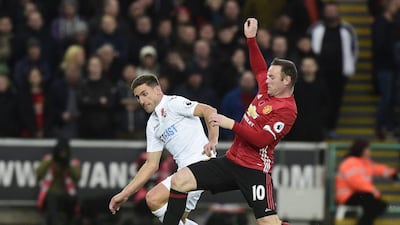It may have been just as Ed Woodward imagined it. The most expensive footballer ever, Paul Pogba, put Manchester United ahead in spectacular style. One of the global game’s most recognisable figures, Zlatan Ibrahimovic, scored two goals. Another of them, Wayne Rooney, recorded two assists.
The manager Woodward had described as the best around, Jose Mourinho, was rewarded for making radical changes to his team.
Swansea City, it appeared, were crushed by the weight of fame alone. This was winning football, Galactico style. Yet it is not merely the insipid nature of a Swansea side who have regressed since Bob Bradley’s appointment nor United’s recent traditions of false dawns that should prevent this from being hailed as a turning point or a winning formula that will provide the basis for the rest of the season.
• Premier League Team of the Week: Pogba among this week’s Best XI
Mourinho’s strength always used to lie in his ability to find a way to win and he did at the Liberty Stadium, but while attention could be diverted by the patched-up defence, none of who figured in his back four two weeks earlier, it is worth considering the composition of the midfield and attack: Ibrahimovic, Rooney, Pogba, Juan Mata, Marouane Fellaini and Michael Carrick.
And in that company, the Frenchman stands out. Pogba has the athleticism to accompany the wonderful technical ability he illustrated by hooking the ball into Lukasz Fabianski’s net from 20 yards. But the other five, to put it bluntly, are slow. They are slow at a time when football seems to be getting faster. The more fashionable philosophies entail high-pace pressing games, as purveyed by Liverpool, Tottenham and Manchester City.
Those clubs seem to contain players who are both sprinters and distance athletes. They are personified by Roberto Firmino, who covers on average 11.5 kilometres per game, with 78 sprints. His Anfield colleague Emre Can objected to a question last week that he was mainly a technical player by pointing out that he, too, runs more than 11 kilometres every game, with ever more at high intensity.
Then consider the United quintet. Fellaini has the stamina, but not the acceleration. Rooney has lost the physical edge he once boasted. Mata plays the game at his own speed. Ibrahimovic is as quick as most 35-year-old target men are. Carrick, in the words of the cliché, never had any pace to lose.
The strategist at the base of the midfield adds cohesion, just as United are nearly always at their most creative with Mata in the team and Ibrahimovic, his longest drought since 2007 ended, is their top scorer. It makes Rooney and Fellaini the most vulnerable.
Because collectively they are out of step with the times, just as there are concerns that Mourinho’s brand of football is outdated in an era defined by managers such as Jurgen Klopp, Pep Guardiola, Mauricio Pochettino and Antonio Conte, who has exiled the slow Cesc Fabregas from his Chelsea team.
Pointing the figure at Mourinho alone ignores the reality that four United managers have combined to accumulate such a contingent of the slow. Louis van Gaal, who bought Daley Blind and Bastian Schweinsteiger and employed such a laboured style of play, was particularly culpable. Yet it is Mourinho’s problem.
He reacted to circumstances at Swansea, parachuting in experience when a win was needed and responding when his hand was forced by Ander Herrera’s suspension. With Ibrahimovic banned for next week’s game against Arsenal, he will have to change again. But tellingly, Arsenal have been revived with an added emphasis on pace. United cannot afford to field a team with too many who are unable to win a foot race. If so, they risk a role reversal of the days when Sir Alex Ferguson used his fittest, fastest players to overpower the London side.
Now United, off the pace in the title race, look the resident slow coaches. Partly because players such as Anthony Martial, Marcus Rashford, Jesse Lingard and Henrikh Mkhitaryan are outside the starting 11 and partly because their game plan is based less on non-stop, high-speed running. Because the risk is that United, far from looking an ultra-modern gathering of the super-famous, appear an anachronism.
sports@thenational.ae
Follow us on Twitter @NatSportUAE
Like us on Facebook at facebook.com/TheNationalSport


